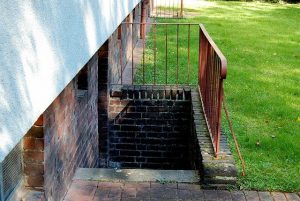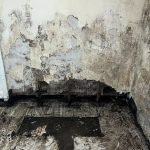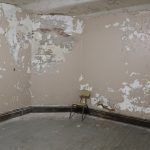
Here’s How to Get Rid of that Musty Smell in your Basement
The basement can be one of the smelliest places in a home, and the odor can be caused by a variety of problems. If the basement smells musty, then it is most likely due to the presence of mold and mildew in your basement. Molds and mildew thrive in damp places. To prevent illness caused by mold and mildew, you need to remove the musty odor from your home.
The musty odor is often strongest during the spring and fall seasons when the windows are closed, and the utilities are not running. To get rid of musty smell in the basement, make sure you keep all areas of your home well ventilated.
What Causes the Musty Basement Smell?
Mold and Mildew
Mold and mildew not only cause odors in your basement, they can also damage the structural integrity of your home on porous surfaces such as wood if left unchecked. Much of the underlying structure of your home is made of wood, so make sure you treat mold early to prevent serious structural damage.
The mold spores can also cause or aggravate respiratory health issues like asthma and allergies. Often, respiratory illness is one of the earliest signs of a mold problem since they make people more sensitive to the presence of mold and mold spores.
It is also important to clean the air ducts on a regular basis and have the ventilation system checked at least once every two years. Mold in your basement can get into the ventilation and HVAC systems of your home, spreading the problem and mildew smell from basement throughout the rest of the home.
Damp Basements

There are two main causes of damp basements; water leaks and condensation (due to high humidity). If the basement has a musty or damp smell, it might be helpful to try getting a dehumidifier. You can also air out the room by opening the windows if your basement has any.
To prevent water leaks, make sure that the basement is waterproofed. Even a small leak can lead to a lot of moisture on the basement floors. If you can see leaks or water stains, then you should take care of it right away before they can lead to serious damage to the foundation of your home.
If you find a leak, make sure you inspect the area around the property to make sure that the water flows away from your house and not toward it. Downspouts must be extended at least six feet from the wall. And if you find water pooling near the walls, correct the slope right away, so that pooling along the walls is avoided.
Pets
Another common reason for musty smells in a basement is pets and pet supplies. Many people keep cat litter boxes, spare litter, or similar items in their basements to keep the smell out of their homes. However, this is usually fairly easy to rule out; just remove pet supplies from your basement temporarily to make sure that there’s not another reason for the musty smell- such as a hidden mold problem.
How to Get Rid of Musty Smell In the Basement
As soon as you find out what it is, you need to get rid of that musty smell from the basement at the source. Just covering up the smell isn’t enough. You need to remove any mold and mildew quickly, and then place dehumidifiers, cat litter, or baking soda to absorb the moisture and any residual odor.
Cleaning Up Mold and Mildew
Mold and Mildew Cleaning Solution
If there is mold and mildew in your wet basement, you can begin killing mold with a few simple cleaning products that you most likely at home. All you need is to mix one-half cup of bleach with one gallon of warm water.
Place the solution in a spray bottle and clean the area of mold and mildew. Make sure that the windows are open to keep air circulating. You can use the cleaning solution on basement floors, bathrooms, walls, cement, laundry area, and other parts of the basement that will not have a reaction to bleach.
Another option is to use vinegar. A similar vinegar and water mixture can clean anything that you can’t put bleach on in your basement. Again, you’ll want to make sure that air is circulating. Once it’s clean, use bowls or cups of baking soda to absorb the vinegar smell from the air.
These methods work best if you don’t have a lot of severe mold or water damage. If you find quite a bit of damage make sure you call mold remediation professionals.
Use Kitty Litter or Baking Soda
Even if you don’t have any pet cats, you can use scented cat litter or baking soda to get rid of the moldy basement smell. Those two products tend to absorb moisture and odors. Just be careful; these items don’t actually fix the problem. All they do is hide the musty odor.
To remove the odor, all you need to do is place the litter or baking soda in an open container and put it in the basement. Make sure to change it out regularly. If you have a large basement, use multiple containers. This can also work well in vacant houses to keep them fresh smelling.
Removing Excess Moisture From The Air
If your basement is even partially underground, there’s a good chance the mold and mildew are coming from excess humidity in the air. There are several ways to maintain the level of humidity in the home, such as open windows and using dehumidifiers. The best way to remove moisture from a damp basement is to keep a dehumidifier down there. A single dehumidifier in the basement will remove quite a bit of the dampness and lessen the smell.
My Basement is Dry but Still Smells Musty
If your basement is dry, it can be confusing to smell a moldy smell down there. The truth is that the mustiness probably isn’t coming from the walls or floors of your home at all. It could be coming from old furniture, clothing, boxes, or anything else you might have been storing down there. Other factors that could cause your basement to smell musty include:
- Groundwater: The grading of your lot may result in water flowing towards your home. To address this, consider installing a French drain to redirect the water flow and potentially mitigate any unpleasant odors.
- Drains: Occasionally, dry floor drains can become blocked, leading to a musty or sewer-like smell in the basement area.
- Stored items: It is advisable to inspect any items stored in the basement for signs of mold and mildew growth. These microorganisms can often go unnoticed, concealed within boxes or storage containers.
- Carpeting: In a finished basement, a lingering musty scent may be attributed to previous moisture exposure. Even after the area has dried, the scent can persist.
Preventing Mold Growth
Preventing mold growth and mold exposure can be done simply and easily with a few easy steps. You start by alleviating any mold problems as soon as you notice them so that the smell (as well as the mold itself) doesn’t spread to the upper levels of your home.
It is important that you get rid of the main cause of the problem before you clean up the area. With mold removal, the smell will be less likely to return and prevent mold growing in the near future.
The best way to prevent future mold growth is to make sure that your basement isn’t too damp. There are a few ways you can do this:
- Keep an eye out for any water leaks in your basement and repair them quickly before mold can grow.
- Make sure there’s no standing water and plenty of ventillation in the area.
- If the humidity in your basement is above 50%, consider getting a dehumidifier.
- Check for air leaks in the basement that can let water enter.
- Make sure that your downspouts are draining water far enough away from your foundation.
- Check your vents for cracks and loose ducts.
- Check for and repair any settlement cracks in the foundation of your home.
- If flooding in your basement is a common problem, consider having a sump pump installed.
Do Dehumidifiers Help With Mold?
In short, yes. However, they are primarily helpful with minor mold issues and with preventing mold in the future. Mold grows in damp places, and dehumidifiers help reduce moisture. If you find large amounts of mold in your basement, your best bet is going to be to clean up the mold first, then work on preventative measures such as getting a dehumidifier.
If you need help with Mold Remediation or Odor Removal, give us a call at 888-777-9742!




